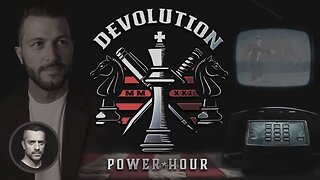Premium Only Content

Swimming with the Sharks: A Day in Court
THE CIVIL RIGHTS THE NAACP AND THE ACLU WON'T TELL YOU ABOUT
Ask any progressive law professor on constitutional law, like Rutger's Professor Ann Freeman, and they will tell you that Frederick Douglas was an "aspirational" leader, and who doesn't immediately think "dream" when referencing "Dr. King", removing any suggestion of religion from the preacher and son of a preacher? But at least Langston Hughes had asked the question about what happens to a dream deferred, providing the basis for the raisin in the sun that became the title of the Lorraine Hansberry play that bore that name, and that had starred on Broadway Ralph Carter, who would later become Michael Evans on Good Times.
And, once again, I am heading to the U.S. Supreme Court, marking my seventh potential chance to have a case docketed for certiorari, one of less than 7,000 cases each year that enjoy that distinction, and a formidable task for even an attorney, and, so, far much more daunting for an unrepresented litigant.
One thing to remember about the Supreme Court is that, for the most part, it is not what an attorney would describe as a court of original jurisdiction, where you would commence litigation, but, rather it is generally an appeals court, requiring someone first to identify an objection that is preserved in the record to raise as an assignment of error, a process with which most unrepresented litigants are wholly unfamiliar.
And, just like if it isn't in the contract you can't do it, a court cannot read your mind, nor try to do so; and what you bring to the court is just about all that will be considered, and if you forgot to raise a point, that's on you.
Accordingly, it is not quite surprising that this is not an argument that is often raised, because unrepresented litigants don't know about appeals, may get tripped up trying to file the appeal, trying to sort through the rules that apply just to begin, and would probably not be familiar with the law or even precedents that have been developed in this particular area of law regarding pro se litigants, or people who have decided, for whatever reason, to represent themselves in court.
Well, if you can't afford an attorney, and will not be appointed one by the court in civil litigation, you probably will have a struggle coming up with the fees required to pay for your statutory right to a day in court, which actually are far more substantial than registering your firearm or obtaining a carry permit, but notice that nobody ever raises this argument, not even the NAACP or the ACLU?
Of record, over 74% of the cases involving unrepresented litigants bringing civil litigation are those who are "mass incarcerated", to use the ACLU term, and over 33% of the cases being brought are for civil rights, the area of expertise for the "oldest and boldest civil rights organization", the NAACP Legal Defense Fund, who apparently believe that the most important right for you is the franchise, if you use it to vote for Democrats who donate to keep them in business. A little conflict of interest?
Think of the application to proceed without payment of fees, or to proceed in forma pauperis, the Latin term, as an application for credit, which, even for folks in prison sitting maybe on a fortune of cigarettes can be denied. However, since 1950, it has been determined that you can file for an appeal of that "credit denial", but you have to submit another "credit application", or have to pay the fee to get a decision for that appeal, which is about a hundred dollars more than the original fee you claimed you could not afford, effectively saying you have no right to appeal if you are poor, and you need to just suck it up, pay the original filing fee after your application is denied, and hope you don't have to submit an appeal when you lose at the court that denied your credit application.
Intriguingly, on this issue, it has been the conservatives, like Thomas, O'Connor and Scalia who have dissented when this has come before the courts, arguing that a person has a right to a day in court and a trial on the merits, and not any progressives. And, now, without the support of the ACLU or the NAACP, it is a conservative bringing this case to a conservative Supreme Court, while the NAACP is submitting an amicus brief, or friend of the court memo, just to say they agree with the position somebody else took, and not filing a case themselves, on voting rights that are supposed to be their priority.
Of course they will not tell you that side of the story when they beg for your money, but let's just say I am keeping it real, and speaking truth to power, and I ain't really Black.
-
 LIVE
LIVE
Lofi Girl
2 years agoSynthwave Radio 🌌 - beats to chill/game to
515 watching -
 5:52:00
5:52:00
Akademiks
12 hours agoWAR IN ATLANTA Episode 5. YOUNG THUG FIRST INTERVIEW about SNITCHING, GUNNA... BREAKS DOWN CRYING!
165K9 -
 7:30:25
7:30:25
SpartakusLIVE
15 hours agoVerdansk Duos w/ Nicky || Saturday Spartoons - Variety Later?!
62.3K1 -
 1:38:47
1:38:47
Badlands Media
1 day agoDevolution Power Hour Ep. 387: Trump, Epstein, Durham Mysteries, and North Korea Ops
104K29 -
 1:05:23
1:05:23
Man in America
19 hours agoSoaring Gold Exposes the Imminent Crash of the Old System w/ John Perez
61.6K22 -
 2:42:40
2:42:40
TruthStream with Joe and Scott
19 hours agoTHOMAS AND GROK: AI, Bible decodes, The JESUS Cube live 9/6 #487
54.7K11 -
 2:34:46
2:34:46
BlackDiamondGunsandGear
14 hours agoGet Prepped / After Hours Armory / LIVE SHOW /
33.1K2 -
 2:01:39
2:01:39
Tundra Tactical
12 hours ago $11.29 earned🛑LIVE NOW!! This spits in the face of the Second Amendment.🛑
41.5K8 -
 2:34:46
2:34:46
DLDAfterDark
11 hours ago $5.20 earnedIt's SHTF! Do You Have What You Need?? Let's Review Items & Priorities
29.4K6 -
 28:58
28:58
Stephen Gardner
12 hours ago🚨Explosive allegations: Rosie O’Donnell connects Trump to Epstein scandal!?
47K86